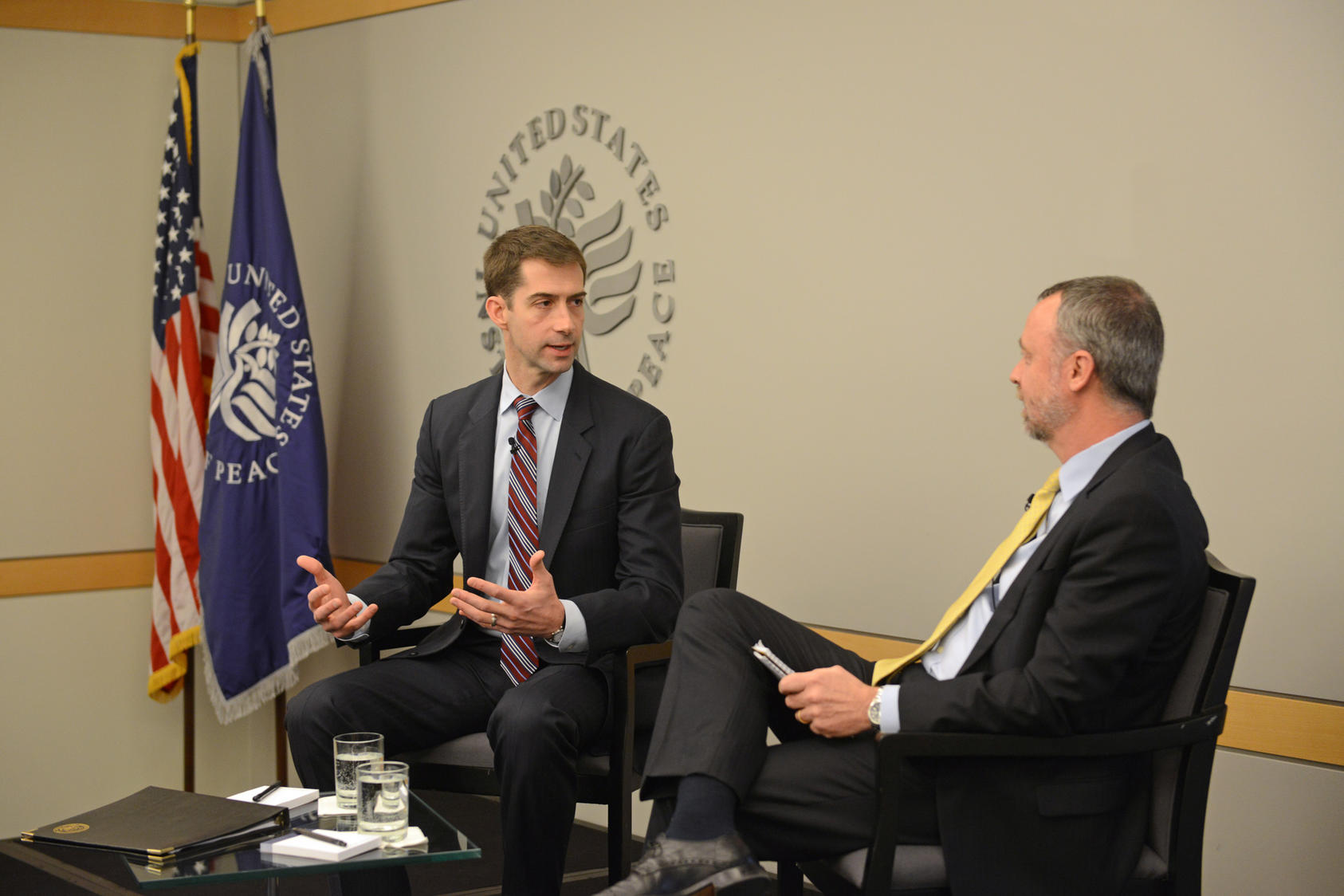Iraq Crisis Builds Bipartisan Support for Keeping U.S. Troops in Afghanistan, Senator Cotton Says
The revival by ISIS of a brutal Islamist offensive in Iraq makes it urgent to prevent a similar reversal in the Afghan war—and is increasing congressional support for President Obama to maintain U.S. troops in Afghanistan, Senator Tom Cotton (R-Arkansas) said today.

The U.S. government “should commit now—today—to keeping at least 10,000 troops in Afghanistan until 2017, and perhaps beyond,” to prevent the Taliban and their Islamist militant allies from re-establishing control over wide swaths of the country, Cotton said in a speech at the U.S. Institute of Peace. President Obama said in May he would end the U.S. combat and advisory role with Afghan forces by the time he leaves office at the start of 2017.
America is safer today because [of] our efforts in Afghanistan.
Cotton said ISIS guerrillas’ seizure of much of Iraq, four years after Obama ended the main U.S. military mission there, has moved public and congressional opinion to favor scrapping the fixed date for a final pullout from Afghanistan. His remarks came a day after Obama’s nominee as defense secretary, Ashton Carter, told Cotton and other members of the Senate Armed Services Committee that the United States should “finish the job” in Afghanistan. Carter said he would “recommend … changes (in the pullout plan) to the president” if security conditions in Afghanistan deteriorate.
Debate over the Afghan pullout policy is likely to intensify in the weeks before Afghan President Ashraf Ghani visits Washington in March. The government headed by Ghani and Chief Executive Abdullah Abdullah is more publicly supportive of the U.S. role than was former President Hamid Karzai. That “gives us a chance to reset … the debate” over a continued U.S. military presence in Afghanistan, Cotton said. Cotton, who was elected to the Senate in November, served as an Army officer in Iraq and Afghanistan.
While no political leader relishes changing a policy decision, “President Obama will find that he has not just supporters, but advocates within my own party, as well as his own” for an extension of the military mission in Afghanistan, said Cotton. As the Taliban have intensified their fight to oust the government, the United Nations mission in Kabul counted more than 10,000 Afghan civilians killed or wounded in 2014, making it the deadliest year of the war for non-combatants.
Before his speech, Cotton met at the Institute with former US officials and specialists on Afghan and security policy to discuss Afghanistan, including the troop pullout by 2017. “The argument for a change (in the pullout plan) is strengthened by two factors that have changed since the president made his decision” last year, said former U.S. Ambassador Zalmay Khalilzad, one of those in the discussion. They are the collapse of state control in much of Iraq, and a general deepening of Islamist militant threats caused by the growth of ISIS (the Islamic State of Iraq and Syria).
A difference between Iraq and Afghanistan is that “the Afghan people and government want this role” by the U.S. military, said Khalilzad, who served as ambassador to both Afghanistan and Iraq. The government of Ghani and Abdullah has asked the United States to lead the international community in sustaining financial and other help for Afghanistan for the coming decade.
“Afghanistan is not hopeless,” Cotton said in his speech. “Afghans, Americans, and international partners on the contrary have made tremendous gains there—gains that have made the country safer and more secure, while giving millions of Afghans a chance to live safe, healthy, honorable, and meaningful lives. America is safer today because [of] our efforts in Afghanistan.”
Afghanistan is an enduring focus of the U.S. Institute of Peace, which “has been there since 2002, working on initiatives to counter violent extremism, to strengthen the rule of law, [and] support civil society organizations working to prevent and mitigate violent conflict,” said the Institute’s new president, Nancy Lindborg, who introduced Cotton. His speech and discussion at the Institute was co-sponsored by the Washington-based Alliance in Support of the Afghan People, a non-partisan group that advocates continued U.S. and international help for Afghanistan.



